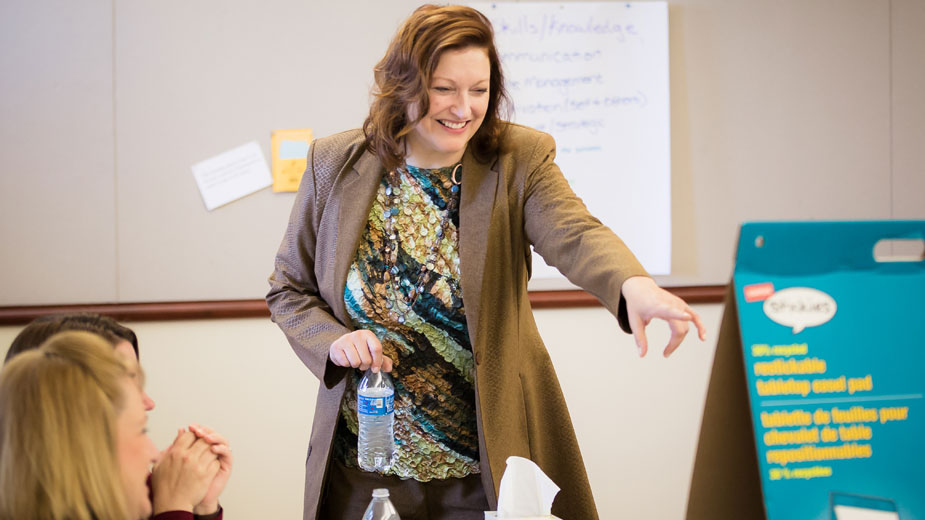Boot Camp Prepares Workers for Promotions
YOUNGSTOWN, Ohio – John C. Maxwell famously advises, “People buy into the leader before they buy into the vision.” Maxwell, the author of “The 21 Irrefutable Laws of Leadership,” says a leader must first establish credibility with his team to achieve a goal.
For a worker recently promoted to a position of leadership after working for years on a production line, that’s not always an easy task, says Faith Sheaffer-Polen, director of the Corporate University and Conference Center at Kent State University Stark campus.
“You can be very good technically. But if you can’t get along with people, that’s the major thing that holds companies back,” Sheaffer-Polen says.
To help workers who are being promoted to managerial or supervisory positions, Kent State Corporate University offers supervisory and management training courses that focus on the soft skills needed for that transition. Beginning in January, classes will be conducted in Salem at the SOD Training Center inside the Sustainable Opportunity Development Center Inc., 440 Pennsylvania Ave.
While people are hired based on their technical or mechanical skills and knowledge, typically acquired through an apprenticeship or post-secondary education, supervisors require a set of skills that most people don’t have. This includes communications, coaching and conflict resolution.
“These are the things that people aren’t always taught how to do before they become a supervisor or manager,” Sheaffer-Polen says. “We’re not educating people to be managers right out of the gate.”
That’s a problem for business, she continues, because supervisors and employees need to work together smoothly. Supervisors trying to lead a team that has no cooperation or collaboration will spend most of their time dealing with “people issues,” such as conflicts of personality or sabotage.
Supervisors who can’t manage their teams often find themselves in hot water with employers who want workers who can get a job done despite having a difference in opinion, she says. One of the most common issues that Sheaffer-Polen sees is supervisors not speaking respectfully to their workers.
“‘Can I stay in my adult state and still get the work done, or do I let the little kid in me come out and disrupt work?’ ” she offers as an example. Unfortunately, disruption is “more common,” she says. “Work is being disrupted because people don’t know how to get along.”
This also creates retention issues, she notes, saying that younger workers won’t put up with that behavior and “they’ll just leave.”
Through the management training course, students learn how to communicate more effectively to settle conflicts before they disrupt work, she says. A one-day, four- to eight-hour Supervisory Boot Camp teaches students the critical functions and skills that supervisors need and clarifies the supervisor’s role, responsibilities and accountabilities, including expectations from workers and employers.
After that, students can continue their training with a six-session certification program with one class monthly, she says.
Since the program began five years ago, Kent State Corporate University has served more than 3,000 students through open enrollment and customized classes. About 60% of classes are customized, in which Sheaffer-Polen works directly with senior management at a company to design and implement a class.
“We are not just order-takers,” she says. “We’re getting to what is the root of the problem to effect sustained change and to correct the issue.”
Workers in Salem and surrounding areas can take advantage of the Boot Camp at the SOD Training Center in Salem. During conversations between manufacturing executives in the area and the executive director of the SOD Center, Julie Needs, supervisor training “kept coming up over and over again” when discussing immediate needs, says the center’s training administrator, Lesley Kline.
“There are so many people who come into manufacturing and after working on the line for a few years get moved into a supervisory role,” Kline says. “Knowing the job is one thing. But knowing the skills to transition from a peer to a supervisor is different.”
As the workforce ages in manufacturing and skilled trades, people are retiring faster than employers can bring in new workers, she continues, and that attrition includes management and supervisors.
“We’re trying to develop the workforce to move into those jobs,” Kline says. “But as you have those jobs open through attrition, you have to fill all levels of the workforce.”
The training costs $140 for SOD Center members and $175 for individuals. SOD will host two Boot Camp classes on one day – a morning and an afternoon session – with each class having 20 students. If there is enough interest in the Boot Camp, SOD will host the additional classes for the leadership certification, Kline says.
SOD operates like a co-op, so it can offer the Boot Camp and other programs at discounted rates. When area employers have a need, SOD identifies and brings in the necessary trainers to do a “cost-sharing of sorts,” she says. Rather than hire someone to train a few people at a company, multiple employers can send their employees to the group training.
“A lot of what we do is based on the need we’re hearing from employers,” she says.
The center provides other training opportunities, including onboarding for new hires, OSHA safety training and personal development, such as taking responsibility, being a team player, stress and anger management, conflict resolution and effective communication.
“All of those things that make you a good employee,” she says. “We’ve gotten some good feedback from local employers.”
The Boot Camp will coincide with another Kent State class offered at SOD: Crucial Skills for Crew Leaders. The training focuses on three aspects of crew leadership – goals, empowerment and communication – as well as training on some of the legal aspects of being a supervisor.
Crucial Skills is a new, full-day training that helps new crew leaders maintain a sense of authority, Sheaffer-Polen says. New leaders have trouble disciplining workers or doing performance appraisals at first, but are expected to get a crew of former peers on track to work, “and that really takes some finessing,” she says.
“The Crew Leaders class is all about education,” she says. “It’s about getting your message across without irritating everybody.”
The Crew Leaders class and the Supervisory Boot Camp are geared toward people who are employed and have been promoted two or three times, Sheaffer-Polen says. Instructors are contractors who have been working in the specific field for 20 or more years, which makes it easier for them to connect and engage with students as opposed to traditional faculty, she says.
“Students are involved from the minute they walk in the room,” she says. “They’re not going to just be sitting there and listening and taking notes.”
Classes give students skills that can be applied immediately. Employers have said employees are “talking differently the minute they get back,” she says. Feedback from students has also been positive and appreciative, because they realize the training improves their work so they can better care for their families, she says.
“That’s what feeds me,” Sheaffer-Polen says. “Education is crucial and it changes people’s lives. I’ve seen it time and again.”
Employers who are interested in participating in the program can learn more at SODCenter.com. Click “Register For Courses” under the Training Center dropdown menu and click “Supervisory Training/Leadership Development.”
Pictured: Faith Sheaffer-Polen teaches a Supervisory Boot Camp at Kent State Corporate University & Conference Center.
Copyright 2024 The Business Journal, Youngstown, Ohio.



